高中英语语法复习之特殊句式
高中英语---特殊句式全面讲解及练习(含问题详解)

高中英语语法讲义第二讲——特殊句式倒装句通常句式为自然语序“主语+谓语”,有时为了强调句子的某一部分,或者出于词汇用法、语法结构或修辞上的需要,将这种比较固定的语序加以颠倒,就形成了倒装。
分为完全倒装,部分倒装和形式倒装。
一.完全倒装:谓语动词完全置于主语之前,主语为名词不为代词,谓语不用进行时。
1.一些表示地点、时间或方位等的副词或介词短语。
如:here, there, now, then, up, down ,in, out,away, off, in the room, on the wall等置于句首。
Down came the rain and up went the umbrella.Then followed three days of heavy rain.Out rushed the children laughing loudly.Away flew the plane.2.such 位于句首。
Such was Albert Einstein, a simple man and the 20th century’s greatest sc ientist.注:此句型中的such多被认为是表语,所以such后的be动词应与其后真正的主语保持一致。
Such are the facts; no one can deny them.二.部分倒装:只把谓语的一部分(助动词,情态动词或be动词)置于主语之前1.so+ be 动词/ 助动词/ 情态动词+主语,意为“...也是如此”。
They love making lots of friends; so do I.2.neither/nor+ be动词/助动词/情态动词+主语,意为“...也不这样”。
Lily can’t ride a bicycle; neither/nor can Lucy.3.否定词never, seldom, nor, not, little, hardly, scarcely等或表示否定意义的介词短语at no time,under/in no circumstances, in no case, by no means, on no condition 等置于句首时。
高考英语语法特殊句子汇总

高考英语语法特殊句子汇总高考英语语法是考生必须要掌握的重要内容之一。
在高考英语中,语法的正确运用可以帮助考生提升阅读理解、完形填空、短文改错和写作等题型的得分。
其中,特殊句子是语法中的一个重点。
下面将详细介绍一些高考英语中常见的特殊句子及其用法。
一、倒装句1. 全部倒装句:主语位于谓语动词之后,常用于表示否定、条件、半倒装和祝愿等情况下。
例句:Not only does he study hard, but also he helps others.2. 部分倒装句:谓语动词前的助动词、系动词或情态动词放在主语之前,常用于表示祝愿、建议、要求、命令和表语从句的应该、能够等情况下。
例句:Little did I know about the difficulties they were facing.二、强调句1. 强调句的基本结构为“It is/was + 被强调部分 + that/who + 句子的其他部分”,常用于对某个人、事物或情况进行强调。
例句:It was in the park that I met my old friend.2. 对特定词进行强调时,使用特殊的结构“it is/was + 被强调部分 + (who/that) + 其他成分”,常用于对时间、地点、原因和方式等进行强调。
例句:It was because of his help that I finished the project on time.三、虚拟语气1. 条件句中的虚拟语气:表示与事实相反的假设,条件从句用过去完成时,主句用“would/could/should/might + have + 过去分词”的形式。
例句:If I had studied harder, I would have passed the exam.2. 虚拟语气在宾语从句中的应用:表示愿望、建议、要求等,表达方法为:should + 动词原形,或动词原形前加动词的一般过去式。
高中英语特殊句式

2.否定副词或短语never, nor, not, hardly, little, seldom, at no time, by no means, in no case等置于句首时. Never before have I seen such a moving film. 我以前从未看过这么感人的电影. At no time will China be the first to use the nuclear weapons. 在任何情况下中国绝不会第一个使用核武器.
There goes the bell.铃响了. On the table were some flowers.桌子上有一些花.
2.such置于句首时 Such was Albert Einstein, a simple man and the 20th century’s greatest scientist.
温馨提示 在There be句型中,be动词根据靠近be动词的名词的单 复数来变化.例如: There is a desk and two chairs in the room. There are two chairs and a desk in the room. 房间里有一张桌子和两把椅子.
4.表语置于句首时 为了保持句子平衡或强调表语部分,可将作表语的形容词、分词、 介词短语等置于句首,构成完全倒装形式,即:形容词/现在分词/ 过去分词/介词短语+be+主语. Happy are those who are contented. 知足者常乐. Present at the meeting were twenty teachers and thirty students. 20位老师和30位学生参加了会议. Seated on the ground are a group of young people. 席地而坐的是一群年轻人.
高考英语语法复习特殊句式-倒装句,强调句,反义疑问句,感叹句,祈使句,略和主谓一致)优质课件

名词前有little ,few, much, many修饰--用how感叹
many changes we have had in China these years !
Class Rules
Be sure to get here before nine. Please come here on time. Don’t be late.
Few people knew the news, ______?
Tom has never been to England, ________? 3.陈述句中含有not, no, hardly, neither, never, few, little, too…to等否定词或具有否定意义的词时,疑问部分常 用肯定形式。
表示请求、命令、叮嘱、邀请、劝告等的句子。
祈使句的肯定句一般由动词原形开头, 否定句以Don’t开头。
祈使句的应用
1. 否定的祈使句
Let's not laugh at other people. Don't let us miss Monique’s class. No fighting.
祈使句的否定句型: Don’t +v. 原形… Let’s not + v. 原形… No +v.-ing
7.在肯定的祈使句后,用 will you? would you? won’t you? 在否定的祈使句后,只能用 will you?
Let’s go, ______? Let us listen to Monique, ______? 8.在Let’s祈使句后加上 shall we?, 在Let us(me, him..) 后加上 will you? 或 won’t you?
【高考英语一轮复习】第四讲 特殊句式

第四讲 特殊句式特殊句式近五年仅仅考查过祈使句。
但特殊句式为构建复杂句式、分析长句提供了坚实保障。
备考把握以下内容:1.特殊句式包括:①强调句 ②倒装句 ③省略句 ④祈使句 ⑤感叹句 ⑥附加疑问句2.高考考查热点:①强调句中的it 和that ②特殊句式中的there be ③一些常用的固定表达结构一、完全倒装完全倒装是指将句子中的谓语动词全部置于主语之前。
此结构通常只用于一般现在时或一般过去时。
二、部分倒装部分倒装是指将谓语的一部分,如助动词或情态动词,置于主语之前。
如果句中的谓语部分不含有助动词或情态动词时,则需添加助动词do, does或did,并将其置于主语之前。
将下列句子变为倒装句①She didn’t have supper until her mother returned.→Not until her mother returned did__she__have__supper.②I hardly think it possible to finish the job before dark.→Hardly do__I__think__it__possible__to__finish__the__job__before__dark.③He learned the sad news only after the war.→Only after the war did__he__learn__the__sad__news.④He speaks English so clearly that he can always make himself understood.→So clearly does__he__speak__English__that__he__can__always__make__himself__understood.强调句型的基本结构单句语法填空/补全句子①It was when I got back to my apartment that I first came across my new neighbors.(天津卷单选改编)②It was only when the car pulled up in front of our house that__we saw Lily in thepassenger seat.(2018·天津卷单选改编)③It__was__not__until__midnight__that the noise of the street stopped.直到午夜,街上的嘈杂声才停止。
高中英语语法复习之特殊句式

高中英语特殊句式特殊句式包含:A.there be 句型B.倒装句C.强调句D.省略句E.插入语F.分隔句式A. there be 句型1、there be 句型的意义:表示“某处有某物”。
2、there be 句型的时态there is/are ; there was/were ; there will be /there going to be ;3、there be 句型的特殊用法:there be 不可与have 连用there be 后的谓语动词遵循就近原则there be 的反义疑问句为谓语动词+therethere +具体的动词使表达更生动there be 的非谓语动词为若前面的动词后是不定式时,就用there to be若前面的动词后是v-ing 时,就用there being4、there be 句型的固定搭配there is no use / sense / point + v-ingthere is no need +to dothere is no doubt +that 从句B.倒装句倒装语序,分全部倒装和部分倒装。
全部倒装是把全部谓语放在主语之前,部分倒装是把助动词、情态动词、be动词放在主语之前。
一、全部倒装(1.2.3.4.5作为了解)1. there be 句型:可以用在这类句型中的动词除be外,还可用live,happen,exist,remain,stand等等作这类句型的谓语。
There are many students in the classroom.Long ,long ago there lived a king who loved horses very much.2. Here/There/Now+vi.(常为come, go)+主语(必须是名词)比较:Here you are !此句型中here/there用来唤起注意意思是“喂,注意了”。
高考英语特殊句式分类汇总
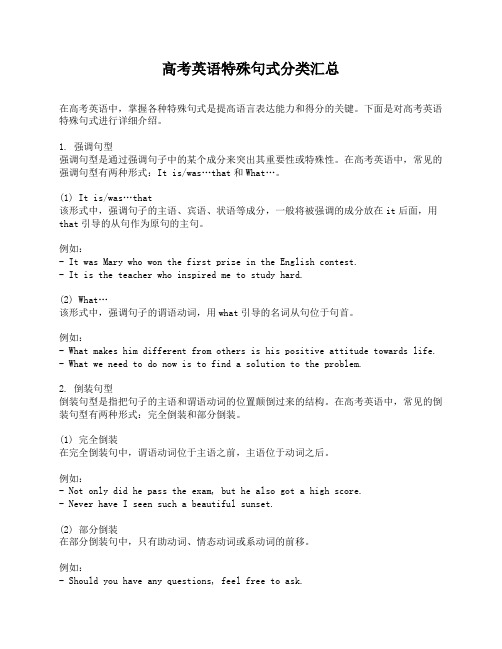
高考英语特殊句式分类汇总在高考英语中,掌握各种特殊句式是提高语言表达能力和得分的关键。
下面是对高考英语特殊句式进行详细介绍。
1. 强调句型强调句型是通过强调句子中的某个成分来突出其重要性或特殊性。
在高考英语中,常见的强调句型有两种形式:It is/was…that和What…。
(1) It is/was…that该形式中,强调句子的主语、宾语、状语等成分,一般将被强调的成分放在it后面,用that引导的从句作为原句的主句。
例如:- It was Mary who won the first prize in the English contest.- It is the teacher who inspired me to study hard.(2) What…该形式中,强调句子的谓语动词,用what引导的名词从句位于句首。
例如:- What makes him different from others is his positive attitude towards life. - What we need to do now is to find a solution to the problem.2. 倒装句型倒装句型是指把句子的主语和谓语动词的位置颠倒过来的结构。
在高考英语中,常见的倒装句型有两种形式:完全倒装和部分倒装。
(1) 完全倒装在完全倒装句中,谓语动词位于主语之前,主语位于动词之后。
例如:- Not only did he pass the exam, but he also got a high score.- Never have I seen such a beautiful sunset.(2) 部分倒装在部分倒装句中,只有助动词、情态动词或系动词的前移。
例如:- Should you have any questions, feel free to ask.- Can you imagine how excited I was when I received the good news?3. 条件句型条件句型是指表示条件关系的句子结构。
高中英语高考特殊句型整理汇总(共33类)

高考英语特殊句型1.It’s ( is / has been ) two years since he left China.2.It’s ( is ) the first time that I have visited Shanghai.3.have / has been to…曾经到过某地have / has gone to …去了某地4.无主语的固定句式:1) It must be pointed out that …必须指出2) It is reported that …据报道3) It is believed that …大家相信4) It has been decided that …经决定5) It is thought that …大家认为6) It is take for granted that …被视为当然的7) It’s said that …据说8) It is known that …众所周知5.Where there is a will, there’s a way.6.表示倍数的句型:1) 倍数 + as…as2) 倍数 + -er + than3) 倍数 + the size ( length; depth… ) of the + n.7.定语从句句型:1) One who has nothing to fear for oneself dares to tell the truth.2) Anyone who fails to finish the task given should be criticized.3) Those who want to go to the Great Wall sign up here.4) As everybody knows , Taiwan belongs to China./ Taiwan belongs to China, as everybody knows.5) one of + 复数名词 + 关系代词 + 动词复数; the ( only ) one of + 复数名词 + 关系代词 + 动词单数;egs.Titanic is one of the most wonderful movies that have been produced in Hollywood.Titanic is the ( only ) one of the most wonderful movies that has been produced in Hollywood.8.主语从句句型:1) It’s true that the earth is round./ That the earth is round is true.2) Whether he will come ( or not ) hasn’t been decided.3) Whoever leaves the office should tell me./ Anyone who leaves the office should tell me.表语从句句型:1) China is no longer what she used to be.2) What I wonder is who will be our team leader soon.9.宾语从句句型:1) We think it (is) quite right that all the people ought to obey the laws.2) that 引导的从句:I could say nothing but I was sorry.He differed from other people in that he always looked father ahead in his work.Your composition is quite good except that there are some spelling mistakes.3) 某些形容词后跟宾语从句:I’m sure that he will win./ I’m not sure whether / if the news is true ( or not ).I’m afraid that I’ll be late.He is glad that you passed the exam.4) I don’t think you are right, are you?I think he is right, isn’t he?I doubt whether / if …我怀疑……是否……I don’t doubt that…我毫不怀疑……There’s no doubt that…Without doubt, …Undoubtedly, …10.比较级句型:1) 比较级+ than any other + 单数名词 eg.He is better than any other student in the class.2) 比较级+ and + 比较级 eg.The earth is getting warmer and warmer.3) 越…就越…: the + 比较级…, the + 比较级…Egs.The more a man knows, the more he discovers.The more works of his he read, the more freely he will understand his works.The busier he is, the happier he feels.11.祈使句 + ( , ) + and / or …e your head, and you’ll find a way.Hurry up, or you’ll miss the b us.12.It was not long before I forgot it all.13.need / want / require + to be done / doing14.It 句型: It is easy ( difficult hard important right wrong possible ) to do…It is a pleasure ( pity, pleasant thing, crime, an hour…) to do sth.It takes ( sb.) some time to do sth.15.do nothing but do ; have no choice but to do16.非谓语动词句型:1) To be fair, it is not all his fault.2) Generally speaking, Super girls are popular with the middle school students.3) Judging from his wearing, he must be an artist.4) According to his report, the situation is getting serious.5) There is / are ( I / we ) + ( some ) trouble, problem, fun, pleasure, a good time,a hard time ( in ) + doing sth.6) There’s no harm, hurry, need, use ( in ) + doing sth.7) I suggested my staying here./ I suggested ( that ) he ( should ) start as soon as possible./ His expression suggested he got angry.8) make oneself done ;9) have / get sth.do / done ;10) leave / keep / have sb do / doing ;11) find sth doing / done ; find sb.doing不定式句型:1.It’s easy… for sb.to do…2.It’s clever… of sb.to do …3.It’s a pity… to do…4.It takes sb.some time to do…5.consider doing 考虑做 consider sth./ sb.to do 认为remember doing 记得做过 remember to do 记得去做forget doing 忘记做过 forget to do 忘记去做regret doing 后悔做了 regret to do 遗憾地去做mean doing 意味着做 mean to do 计划, 打算做stop doing 停止做 stop to do 停止去做try doing 试着做 try to do 尽最大努力做go on doing 继续做 go on to do 继续做另一件事used to do sth./ would do sth 过去曾经做 get / be used doing 习惯于做can’t help doing 忍不住做 can’t help to do 不能帮忙做6.advise, allow, permit, forbid sb.to do / Sb.be ~ed to do…advise, allow, permit, forbid doingpromise to do sth./ promise sb.to do sth.7.hope to do / expect sb.to do8.I want something to read./ I want read something.9.宁愿…而不愿… prefer + n.+ to + n.prefer doing + to ( 介 ) + doingprefer to do sth.rather than ( to ) do sth.would /had rather ( sooner ) + do sth.+ than + do sth.would rather ( not ) do sth.宁愿做would rather sb.did 要做 ( 虚 )10.seem, appear, prove to do / to be doing / to have done11.happen to do, happen to sb.12.consider, believe, feel, make, find, know, regard it … to do13.We want to watch TV instead of (而不是)do our homework.instead of doing14.最好做… had better/had best + ( not ) do sth.15.Although there are many difficulties, we are still determined to carry out the task.Despite many difficulties, we are still determined to carry out the task.16.不定式做定语:He is looking for a room to live in.Please pass me some paper to write on.He has no money and no place to live./ I think the best way to travel is on foot.There is no time to think./ You are the first ( person ) to come.I want something to read.17.The boy has his own idea of how to finish it.18.He is easy to deal with./ You are lucky to get there on time.19.In order to / to so as to find a good job, we should study well.20.too…to / enough to doHe is too young to go to school./ He is old enough to go to school.21.独立成分: To tell you the truth, … ( 句子 )To be fair, … ( 句子 ) / To be frank, … ( 句子 )To be sure, … ( 句子 ) / To make matters worse, … ( 句子 )22.感官性动词不定式省略 to , 但在被动语态中要加to .feel, hear, listen to, watch, look at, make, sb.do…Sb.be ~ed to do23.be to do / be about to do / be going to do24.had better / best ( not ) do25.不得不: cannot but do / cannot choose but do / cannot help but do26.do nothing ( = not do anything ) but / except do27.go / come + do egs.Please come sit here./ Go ask you mum.28.Why not do? ( Why don’t you do ? )29.There’s no time to do动名词句型:0.I have / There is / are ( some ) trouble, difficulty, problem, fun, pleasure, a good time, a hard time ( in ) doing / with sth.1.There is no harm, hurry, need, use, good ( in ) doing sth.2.Sb.spend some time ( in ) doing / on sth.3.It is ( of ) no use, good, useless doing …4.Sth.want / need / require doing / to be done …5.be busy ( in ) doing sth./ be worth ( in ) doing sth.be worthy of being done / be worthy to be done-ing 形式的时态、语态和否定egs.Thank you for having helped me so much.I don’t remember having received his letter.= I don’t remember receiving h is letter.He went out without being noticed./ He insisted on not being sent to the hospital.30.虚拟语气句型:a) I wish I did / had done / would ( could ) do…b) Lest + 主语should + V.(原形)they got up early lest they should miss the rain.31.强调句句型:a) It’s …( 被强调内容 ) that…;(陈述句,强调物)It’s …( 被强调内容 ) that /who …( 强调人 )b) Is / Was it … that…? ( 一般疑问句 ) ;Wh- is /was that…?( 特殊疑问句 )c) It’s not until + 被强调内容 + that…d) It is the place where-cl(强调定语从句)e) It’s because-cl (强调状语从句) that…32.倒装句句型:a) Only + 状语(词 / 短语 / 从句)+ 助动词/be + 主语i.Only in this way can we work out the problem.ii.Only here can we step in.iii.Only when he comes back , could we start eating.b) Only + 主语(不倒装):Only you can go with me.c) Were / Should / Had + 主语 + … + “ , ” + 主句 = If + 主语 + were / should / had…;d) Not until all the people get on it will the bus go.e) as 句型:Young as he is, he knows a lot of things.King as he is, but he is unhappy.f) 一...就...hardly …when…; scarcely…when…; no sooner…than… Hardly did he see me when he ran away.33.省略句句型:a) If necessary / possible…, the boss will go by himself.b) When in trouble, he always asked me for help.c) Though surrounded , the solders didn’t give up.。
高中英语语法复习之特殊句式
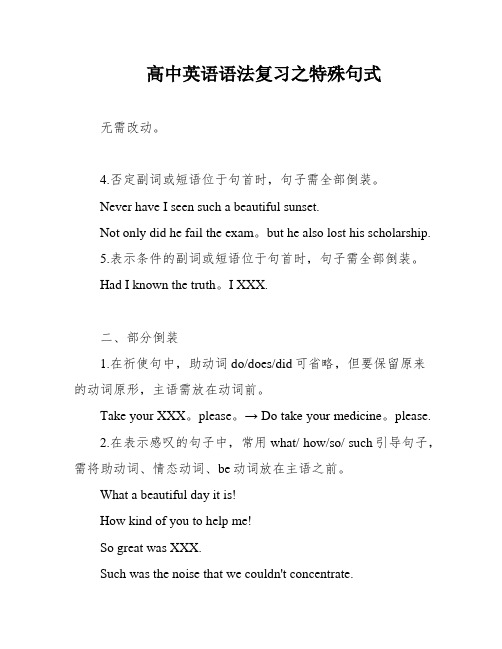
高中英语语法复习之特殊句式无需改动。
4.否定副词或短语位于句首时,句子需全部倒装。
Never have I seen such a beautiful sunset.Not only did he fail the exam。
but he also lost his scholarship.5.表示条件的副词或短语位于句首时,句子需全部倒装。
Had I known the truth。
I XXX.二、部分倒装1.在祈使句中,助动词do/does/did可省略,但要保留原来的动词原形,主语需放在动词前。
Take your XXX。
please。
→ Do take your medicine。
please.2.在表示感叹的句子中,常用what/ how/so/ such引导句子,需将助动词、情态动词、be动词放在主语之前。
What a beautiful day it is!How kind of you to help me!So great was XXX.Such was the noise that we couldn't concentrate.C.强调句强调句是指在句子中通过特殊的语法结构来强调某一成分,使其更加突出。
1.强调句的结构:It is/was + 被强调部分 + that/who + 其他成分。
It was Tom who won the first prize.It XXX.2.强调句中被强调部分的形式:可以是名词、代词、形容词、副词、动词、介词短语等。
It was the best movie I have ever seen.It is only with hard work that you can achieve success.3.强调句的注意事项:强调句中的被强调部分通常放在句首或句末。
强调句中的谓语动词要与其主语保持一致。
强调句中的that/who可以省略,但要注意谓语动词的变化。
高中英语语法:特殊句式
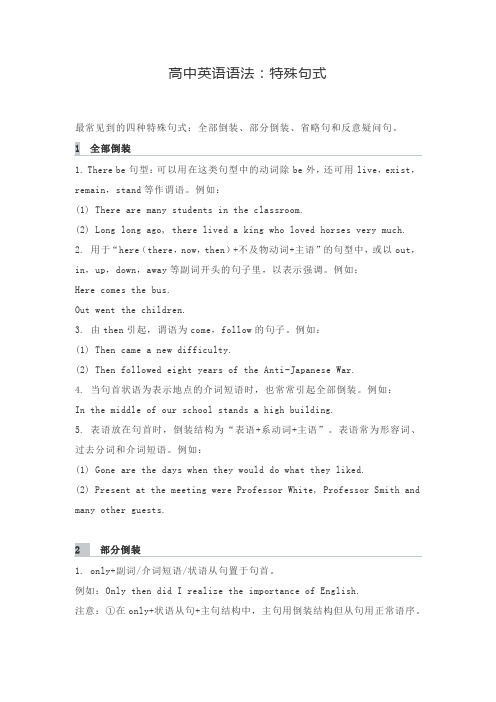
高中英语语法:特殊句式最常见到的四种特殊句式:全部倒装、部分倒装、省略句和反意疑问句。
1 全部倒装1. There be句型:可以用在这类句型中的动词除be外,还可用live,exist,remain,stand等作谓语。
例如:(1) There are many students in the classroom.(2) Long long ago, there lived a king who loved horses very much.2. 用于“here(there,now,then)+不及物动词+主语”的句型中,或以out,in,up,down,away等副词开头的句子里,以表示强调。
例如:Here comes the bus.Out went the children.3. 由then引起,谓语为come,follow的句子。
例如:(1) Then came a new difficulty.(2) Then followed eight years of the Anti-Japanese War.4. 当句首状语为表示地点的介词短语时,也常常引起全部倒装。
例如:In the middle of our school stands a high building.5. 表语放在句首时,倒装结构为“表语+系动词+主语”。
表语常为形容词、过去分词和介词短语。
例如:(1) Gone are the days when they would do what they liked.(2) Present at the meeting were Professor White, Professor Smith and many other guests.2 部分倒装1. only+副词/介词短语/状语从句置于句首。
例如:Only then did I realize the importance of English.注意:①在only+状语从句+主句结构中,主句用倒装结构但从句用正常语序。
(完整版)高考特殊句式知识点总结,推荐文档.doc
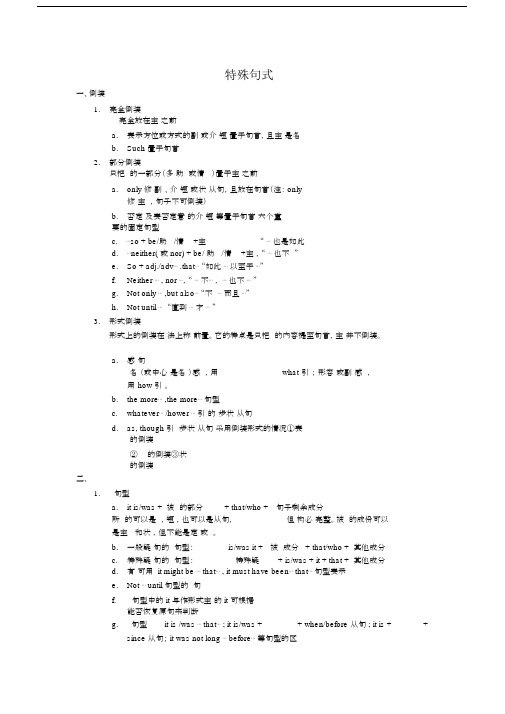
特殊句式一、倒装1.完全倒装完全放在主之前a.表示方位或方式的副或介短置于句首,且主是名b.Such 置于句首2.部分倒装只把的一部分(多助或情)置于主之前a.only 修副、介短或状从句,且放在句首(注: only修主,句子不可倒装)b.否定及表否定意的介短等置于句首六个重要的固定句型c. ⋯so + be/助 /情 +主“ ⋯ 也是如此d.⋯neither( 或 nor) + be/ 助 /情 +主,“⋯也不”e.So + adj./adv⋯ .that⋯“如此⋯以至于⋯”f.Neither ⋯ , nor ⋯,“ ⋯不⋯,⋯也不⋯”g.Not only ⋯ ,but also⋯“不⋯而且⋯”h.Not until ⋯“直到⋯才⋯”3.形式倒装形式上的倒装在法上称前置。
它的特点是只把的内容提至句首,主并不倒装。
a.感句名(或中心是名)感,用what 引;形容或副感,用how 引。
b.the more⋯ ,the more⋯句型c.whatever⋯ /hower ⋯引的步状从句d.as, though 引步状从句采用倒装形式的情况①表的倒装② 的倒装③状的倒装二、1.句型a. it is/was + 被的部分+ that/who + 句子剩余成分所的可以是,短,也可以是从句,但构必完整。
被的成份可以是主和状,但不能是定或。
b. 一般疑句的句型:is/was it + 被成分 + that/who + 其他成分c. 特殊疑句的句型:特殊疑+ is/was + it + that + 其他成分d.有可用 it might be ⋯ that⋯ , it must have been⋯ that⋯句型表示e.Not ⋯ until 句型的句f.句型中的 it 与作形式主的 it 可根据能否恢复原句来判断g. 句型it is /was ⋯ that⋯ ; it is/was ++ when/before 从句 ; it is ++since 从句; it was not long ⋯ before⋯等句型的区2.的It is/was ⋯ that⋯构不能,如果需要,用助do, did或 does.三、反疑句1. 述部分含有must 的反疑句当 must 作“必” ,其反疑部分用疑部分用must/mayneedn’t;当含有mustn’t ,其反当 must/may ( might)表示推,即 must 作“一定,准是” , may/might 作“可能” ,可首先将句子改“ I am sure/guess that 从句”,反疑部分的形式根据 be sure/guess 后的从句的形式确定。
【语法复习】高中英语特殊句式(共51张) 课件

答案: B
英语的特殊句式
3.(福建高考)—It's nice.Never before________ such
a special drink!
—I'm glad you like it.
A.I have had
B.I had
C.have I had
D.had I
解析:考查时态及倒装。never 是否定副词,置于句首,
答案: A
英语的特殊句式
5.(宝鸡质量检测一)It was not until midnight
________ we got home because of traffic jams.
A.that
B.when
C.while
D.as
解析:考查强调句型。not ...until句型有两种强调的方
式:一种是将not until短语提至句首,主句采用部分倒
英语的特殊句式
1.在when, while, whenever, till, as soon as, if, unless, as if, though, as等引导的状语从句中,若谓语部分含有be动 词,而主语又与主句主语相同或主语是it时,从句的 主语和be动词常被省略。
英语的特殊句式
The experiment shows that proper amounts of exercise, if carried out regularly, can improve our health.(浙江高考) 实验表明,如果有规律地进行适量运动能强身健体。 Get up early tomorrow, if not (if you don't get up early), you will miss the first bus. 明天早点起床,如果不的话,你会错过早班车。
高考英语必备特殊句式大全(附高考英语常用词汇)
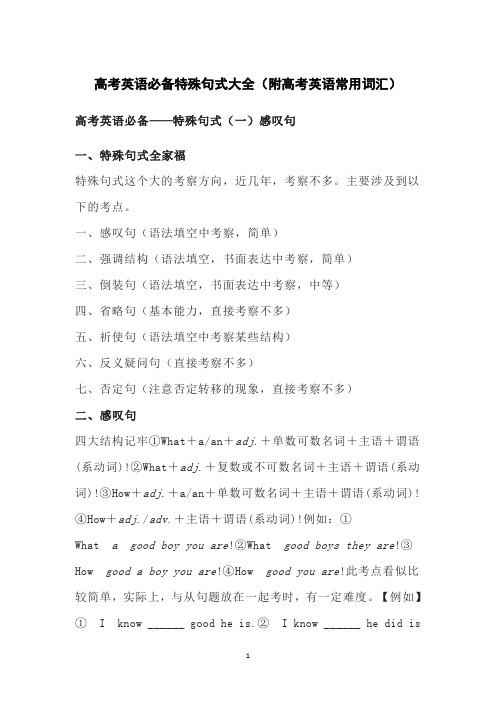
高考英语必备特殊句式大全(附高考英语常用词汇)高考英语必备——特殊句式(一)感叹句一、特殊句式全家福特殊句式这个大的考察方向,近几年,考察不多。
主要涉及到以下的考点。
一、感叹句(语法填空中考察,简单)二、强调结构(语法填空,书面表达中考察,简单)三、倒装句(语法填空,书面表达中考察,中等)四、省略句(基本能力,直接考察不多)五、祈使句(语法填空中考察某些结构)六、反义疑问句(直接考察不多)七、否定句(注意否定转移的现象,直接考察不多)二、感叹句四大结构记牢①What+a/an+adj.+单数可数名词+主语+谓语(系动词)!②What+adj.+复数或不可数名词+主语+谓语(系动词)!③How+adj.+a/an+单数可数名词+主语+谓语(系动词)!④How+adj./adv.+主语+谓语(系动词)!例如:①What a good boy you are!②What good boys they are!③How good a boy you are!④How good you are!此考点看似比较简单,实际上,与从句题放在一起考时,有一定难度。
【例如】①I know ______ good he is.②I know ______ he did isgood.在①中,答案为how,how good he is 是一个how 引导的感叹句;在②中,答案为what,what he did is good 是一个what引导的宾语从句问题来了,如何区分how,what引导的是感叹句还是从句呢?【答案】四个字,句!子!结!构!如宾语或者主语,或者表语;how引导的,其后是一个符合五大基本结构完整的句子。
【经典考察】(1)(2015年新课标卷Ⅱ)As natural architects, the Pueblo Indians figured out exactly ______(70) thick the adobe walls needed to be to make the cycle work on most days.【答案】how;how thick the adobe needed to be符合④How+adj./adv.+主语+谓语(系动词)!结构,故填how;(2)(2021年河南省天一联考)I recently spent a day in Hangzhou to see ______(65) easy it was to go cashless, and I found it somewhat ahead of other cities , including Beijing. I rode buses and subways, which all accept Alipay.【答案】how;how easy it is符合④How+adj./adv.+主语+谓语(系动词)! 结构,故填how;此外,初中的恶人搭配要记牢!how long;how soon;how far;how often;how many;how much【例】how long did he stay here?他在这里呆了多久How long is the river?这条河有多长?How often does he come here?他多久来这里一次?How soon will he be back?他多久之后会回来?How far is it from here to there?从这里到那里有多远。
高中英语高考特殊句式知识点汇总(共五大类)

高考英语特殊句式汇总一、强调句型句型结构形式:It is/was…that/who…be的时态:that/who前面be的时态一般是一般现在时,当它后面的句子为过去时时,才用过去时。
判断方法:将(It is/was)...(that/who)…括号中的词同时去掉,看剩下的部分是否仍然成立。
若成立,则是强调句型;若不成立,则为状语从句、定语从句或主语从句。
They met the manager in the coffee shop the other day.*It was they that / who met the manager in the coffee shop the other day.*Was it they that / who met the manager in the coffee shop the other day?*Who was it that met the manager in the coffee shop the other day?*I wonder who it was that met the manager in the coffee shop the other day.*Can it be in the coffee shop where they once had a cup that they met the manager.* --- Who is making such noise downstairs?--- It is the children.二、祈使句祈使句的主语是you,但一般被省略;当前面有呼语时,一般得补出主语;否定式一般是在前面加Don’t,或是Never。
**在“祈使句,+ and/or/and then+句子”句型中,当祈使句中含有比较级时,可将祈使句中的谓语部分省略,只留下“比较级或比较级与名词,+and/or/and then+句子”。
- 1、下载文档前请自行甄别文档内容的完整性,平台不提供额外的编辑、内容补充、找答案等附加服务。
- 2、"仅部分预览"的文档,不可在线预览部分如存在完整性等问题,可反馈申请退款(可完整预览的文档不适用该条件!)。
- 3、如文档侵犯您的权益,请联系客服反馈,我们会尽快为您处理(人工客服工作时间:9:00-18:30)。
高中英语特殊句式特殊句式包含:A. there be 句型B. 倒装句C. 强调句D. 省略句E. 插入语F. 分隔句式A. there be 句型1、 there be 句型的意义:表示“某处有某物”。
2、 there be 句型的时态there is/are ; there was/were ; there will be /there going to be ;3、 there be 句型的特殊用法:there be 不可与have 连用there be 后的谓语动词遵循就近原则there be 的反义疑问句为谓语动词+therethere +具体的动词使表达更生动there be 的非谓语动词为若前面的动词后是不定式时,就用there to be若前面的动词后是v-ing 时,就用 there being4、 there be 句型的固定搭配there is no use / sense / point + v-ingthere is no need +to dothere is no doubt +that 从句B.倒装句倒装语序,分全部倒装和部分倒装。
全部倒装是把全部谓语放在主语之前,部分倒装是把助动词、情态动词、be动词放在主语之前。
一、全部倒装(1.2.3.4.5作为了解)1. there be 句型:可以用在这类句型中的动词除be外,还可用 live,happen,exist,remain,stand等等作这类句型的谓语。
There are many students in the classroom.Long ,long ago there lived a king who loved horses very much.2. Here/There/Now+vi.(常为come, go)+主语(必须是名词)比较:Here you are !此句型中here/there用来唤起注意意思是“喂,注意了”。
Here comes Mary. → I can see Mary coming.玛丽来了。
There goes the bell. 铃响了。
→I can hear the bell ringing.Here comes the bus.汽车来了。
3. then引起谓语为 come,follow的句子。
Then came a new difficulty. 然后产生了一个新的困难。
Then followed eight years of the Anti Japanese War.接着是八年抗战。
4. 直接引语中间或后面,表示某人说这意思的插入语(特别是谓语较短时)。
“They must be in the fields now,” thought Xiao Lin.“他们准是下地了。
”小林想道。
“Help! Help!” cried the little girl.小姑娘叫道:“救命!救命!”如果主语不比谓语长,或是它后面有宾语,主语就仍然多放在前面。
“Take your seats,gentlemen,” Wilson shouted.威尔逊嚷道:“先生们坐好。
”“That man is a famous star,” Xiao Yang told me in a whisper.小杨低声告诉我说:“那个人是著名的电影明星。
”5. 一般疑问句,特殊疑问句,将助动词放在谓语动词前面;无需倒装的特殊疑问句:对主要进行提问;特殊疑问句用在宾语从句中。
Where are you from?Who helped you clean the classroom?I don’t know when the meeting will be held.6. out,in,up, down,away之类的副词作状语放在句首,主语比较长,也就是说主语不能是很短的人称代词,谓语为不及物动词come,go,run , rush,etc。
句式为:副词+vi.+主语(必须是名词)。
Out rushed the tiger from among the bushes.老虎从灌木丛里冲了出来。
In came the rose fragrance through the windows.玫瑰花香透过窗户飘了进来。
比较:如果主语是人称代词时,不倒装。
The child walked quietly to the bird, away it flew into the forest when he was about to catch it .7. 介词短语作状语放在句首,谓语为不及物动词,主语比较长,也就是说主语不能是很短的人称代词。
句式为:介词短语+vi.+主语(必须是名词)。
In the middle of our school stands a high building.在学校中央有一座高楼。
8. 表语放在句首,表语常为形容词、分词、副词、介词短语。
要求主语比较长,也就是说主语不能是很短的人称代词。
句式为:表语+系动词+主语(必须是名词)。
On the both sides of the street are beautiful flowers.街道两旁有美丽的花。
South of city are two big lakes.城市的两边有两个大湖。
9. 在so...that从句中,如果so+adj./adv. 放在句首,其主句要倒装。
such 、to such +名词放在句首,其主句要倒装。
So loudly did he speak that everyone could hear him.他讲话声音足够大,以至于每个人都能听得见。
Such was Einstein a simple but great scientist.这就是爱因斯坦,一位简朴而又伟大的科学家To such length did he told the story that all of us began to fell sleepy.二、部分倒装(高考考点)1、由as、though、that、引导让步状语从句要用部分倒装或前置2、含有否定意义的副词、连接词放在句首引起的部分倒装3、“so(nor, neither)+助动词 + 主语”与“so(nor, neither)+主语+助动词”之间的区别以及与“ so + 主语+ 助动词”的句式区别4、省略if的虚拟条件句以had / were / should开头引起的部分倒装5、not until 置于句首引起后面句子的部分倒装6、only 短语置于句首引起的部分倒装1、由as、though、that、引导让步状语从句要用部分倒装或前置,主语是代词时不倒装。
句式为:表语/状语/动词原形+as+主语+其他。
Clever as he is,he does n’t study well.虽然他很聪明,但他学习不好。
Child as he is, he knows a lot.虽然他是个孩子,但他懂得不少事情。
注意:表语前的名词无形容词修饰时冠词要省略Much as I like it,I won’t buy it.虽然我非常喜欢它,但我不买。
Try as she might, she failed.虽然她试过了,但还是失败了。
=Although she try as she can,she failed .2、含有否定意义的副词、连接词放在句首引起的部分倒装表示否定的副词 never,nor,neither,表示半否定意义的副词 hardly,few,seldom,little,含有no和not的词组 by no means(决不),in no time(很快),at no time(在任何时候都不),(在任何情况下都不)not until,not only...but also,no sooner...than=hardly...when/scarcely...when。
倒装结构:“否定词+助动词/情态动词+主语+其他”,注意复合句倒装的是主句。
Never have I been in this city.我从没到过这座城市。
Not until I began to work did I realize how much time I had wasted.直到我参加了工作我才意识到我浪费了多少时间。
3、“so(nor, neither)+助动词 + 主语”①“so+助动词/情态动词/系动词+主语”表示前面叙述的情况也适合于另一个人或物,意为“也,同样,也如此”。
②“neither/nor+助动词/情态动词/系动词+主语”表示前面叙述的否定情况也适合于另一个人或物。
注意:1 当so表示对前句内容的肯定、符合,或进一步强调前面所说的情况,或者赞同前面的说法时,应用自然语序。
意为“的确,正是”。
—Tom works hard.汤姆工作很卖力。
—So he does and so do you.的确如此,你也是。
2)倒装部分的助动词、情态动词、连系动词的时态和形式要与前句相一致。
If you don’t go,neither/nor shall I.(If you don’t go,I shall not go.)你不去,我也不去。
注意:表示前面的多种情况也适合于另一人或物,或者既有肯定又有否定情况或涉及到不同类型的动词时可用:It is the same with sth./sb.或 So it is with sth./sb.句型。
She does well in English,but is poor in maths.So it is with Lucy.她英语学得好,但数学学的差,露茜也是如此。
4、省略if的虚拟条件句以had / were / should开头引起的部分倒装如果虚拟条件句的谓语含有were,should ,were可以把if省略而将这三个词放于条件句主语前构成倒装。
If it hadn’t been for their help,we couldn’t have finished the work on tim e.=Hadn’t it been for their help,we couldn’t have finished the work on time.要不是由于他们的帮助,我们不可能按时完成那项工作。
5、在not until ,hardly…when,no sooner…than置于句首引起后面句子的部分倒装主句须部分倒装。
Hardly had he arrived when it began to snow.他一到,天就下起雪来了。
